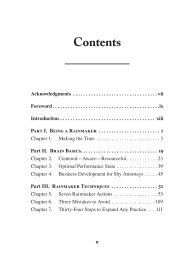(Bk Business) Carol Kinsey Goman Ph.D.-The Nonverbal Advantage_ Secrets and Science of Body Language at Work -Berrett-Koehler Publishers (2008)
Just
Just
You also want an ePaper? Increase the reach of your titles
YUMPU automatically turns print PDFs into web optimized ePapers that Google loves.
98 <strong>The</strong> <strong>Nonverbal</strong> <strong>Advantage</strong><br />
Leaning in while placing h<strong>and</strong>s palms down <strong>and</strong> p<strong>at</strong>ting<br />
them a few times on the table or desk (especially if accompanied<br />
by raised eyebrows) is almost always an indic<strong>at</strong>ion<br />
<strong>of</strong> s<strong>at</strong>isfaction.<br />
TRY THIS<br />
<strong>Nonverbal</strong> communic<strong>at</strong>ion plays a big part in every business<br />
meeting, <strong>and</strong> because people are <strong>of</strong>ten sitting it’s the h<strong>and</strong> <strong>and</strong><br />
arm gestures th<strong>at</strong> are the most noticeable. If you stay alert, you<br />
will notice every kind <strong>of</strong> gesture—some emblem<strong>at</strong>ic, some chosen<br />
for emphasis, <strong>and</strong> some (<strong>of</strong>ten the most interesting) subconscious<br />
signals <strong>of</strong> people’s reactions to wh<strong>at</strong> is going on in the meeting.<br />
Shoulder Positions<br />
<strong>The</strong> position <strong>of</strong> the shoulders sends its own messages. <strong>The</strong>re’s<br />
a good reason, for example, th<strong>at</strong> the phrase “He gave me the<br />
cold shoulder” is a metaphor for feeling rejected by someone.<br />
Shoulder muscles are vulnerable to even the slightest emotional<br />
shift, <strong>and</strong> a subtle change in posture (a dip, a hunch,<br />
or a forward or backward thrust) can give clues to a person’s<br />
inner st<strong>at</strong>e. W<strong>at</strong>ch <strong>and</strong> see if people’s shoulders align with<br />
wh<strong>at</strong> they’re verbalizing. Regardless <strong>of</strong> the words they may<br />
be using, here is wh<strong>at</strong> people’s shoulders are telling you:<br />
<br />
<br />
<br />
People <strong>at</strong> ease have relaxed arms <strong>and</strong> shoulders—<br />
their shoulders drop forward slightly <strong>and</strong> their arms<br />
hang loose.<br />
Shoulders th<strong>at</strong> are lifted <strong>and</strong> pulled back show control<br />
<strong>and</strong> alertness.<br />
Hunched shoulders may be simply bad posture or a<br />
sign <strong>of</strong> resign<strong>at</strong>ion <strong>and</strong> defe<strong>at</strong>.




